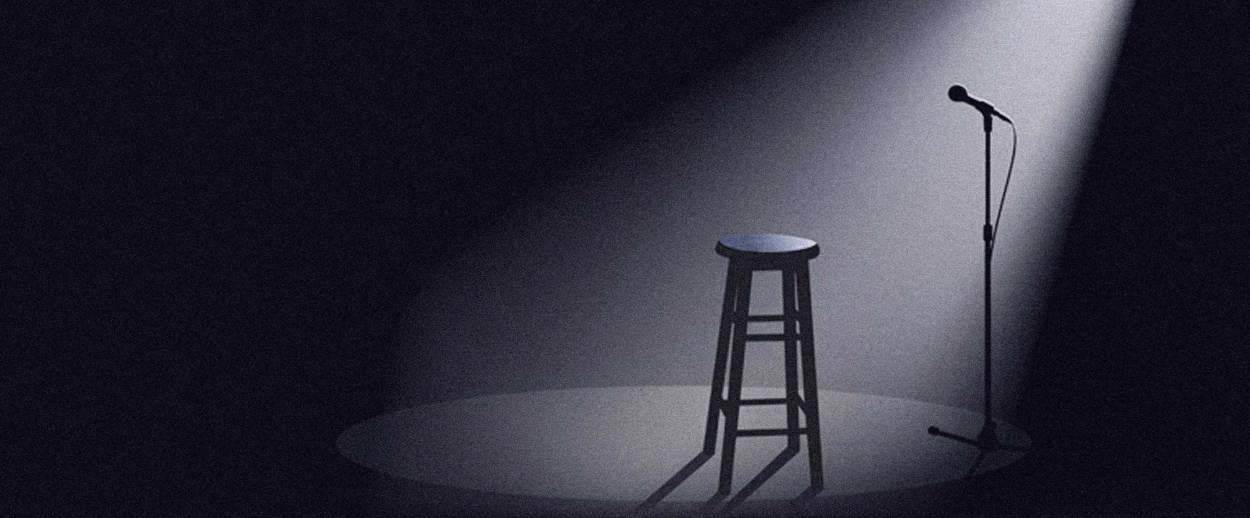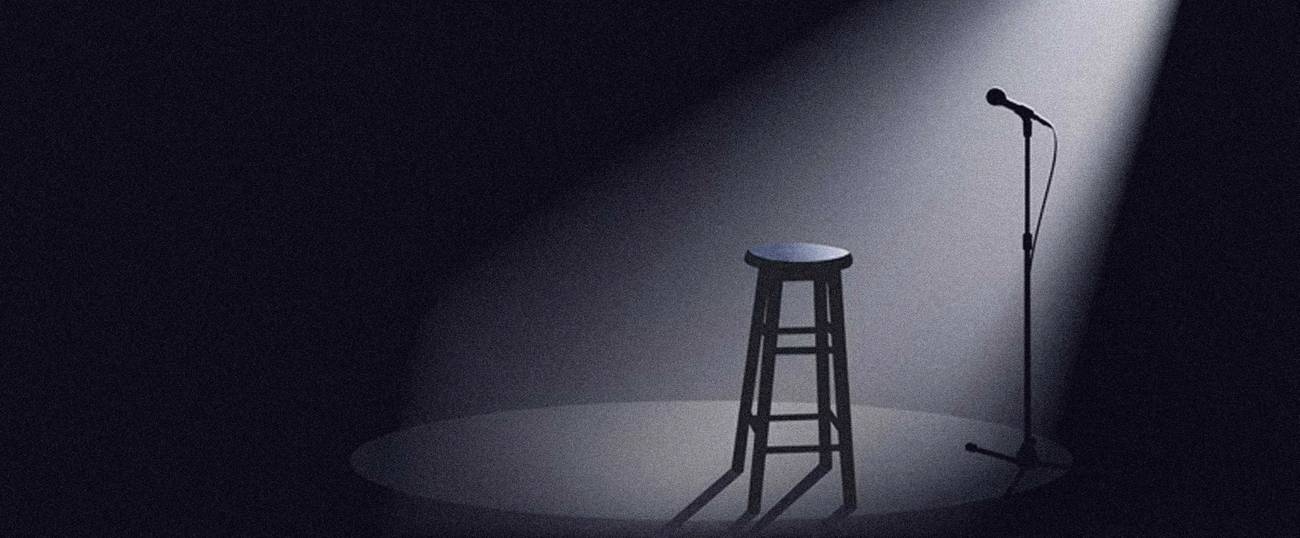Stand-Up Lit From Israeli Fiction’s Mr. Sobriety
David Grossman’s protagonist takes the mic for some Rothian self-loathing, in the ‘raucous’ new novel ‘A Horse Walks Into a Bar’




Over a 35-year career and some 15 books, David Grossman has made a name as the conscience of his nation. That’s a hard role to play for any writer, but especially for one who, like Grossman, has the devilry of imagination in him. The burden is especially heavy in regard to ha-matsav, “the situation”: Israeli’s eternal conflict with the Palestinians. On the eve of the First Intifada, Grossman wrote a famous nonfiction account of Palestinian resentment titled The Yellow Wind, and that bombshell came to overshadow his work as a novelist. Being attuned at every moment to ha-matsav and its corrosive effect on Israeli society, soberly balancing your criticism of your country with an appreciation of its virtues, blasting the right wing while gently chiding the left, reminding everyone not to lose hope for the future … over the long term, such a job description could make you want to throw a TV out the window, Keith Moon-style.
In his latest novel, A Horse Walks Into a Bar, Grossman ditches the responsibility shtick and hurls the TV. The book is a monologue by a wickedly misanthropic stand-up comic, and it’s scurrilous, rancid, and very funny indeed. Dovaleh G, alias Dov Greenstein, Grossman’s hero, is in his mid-50s, divorced, with a handful of kids to support; he’s skinny, double-jointed, and dirty-minded. He’s also sick with prostate cancer, which prompts one of the book’s funniest jokes. Suppose that an Israeli scientist were to discover a cure for cancer—how would the world react? Dovaleh acidly predicts that “there’d be protests and demonstrations and UN votes and editorials in all the European papers, and they’d all be saying, ‘Now, wait a minute, why must we harm cancer? And if we must, do we really need to completely annihilate it right off the bat? Can’t we try and reach a compromise first? Why go in with force straightaway? Why not put ourselves in its shoes and try to understand how cancer itself experiences the disease from its own perspective? … Has history taught us nothing?”
Dovaleh might, we gather, be dead soon from his cancer—or maybe not. At any rate, dying could be his best career move. Complaining from the stage about the lack of posters advertising his show, Dovaleh cracks, “Picasso the lost Rottweiler got more screen time than I did on the utility poles around here. … Respect, Picasso, you kicked ass, and I wouldn’t be in any hurry to come home if I were you. Take it from me, the best way to be appreciated somewhere is to not be there, you get me? Wasn’t that the idea behind God’s whole Holocaust initiative? Isn’t that really what’s behind the whole concept of death?”
Grossman’s Dovaleh hits his stride when he turns on his audience, and turns on himself. In this he is typical, for all truly interesting stand-up comics want to humiliate themselves on stage. They insist that self-hatred is the purest passion of all, the one that really gets to the core of us. In this respect, Dostoevsky’s Notes from Underground was the first stand-up routine.
As a kid, Dovaleh played the clown, walking on his hands to escape being beaten up. Later on, at Gadna, the sleepaway camp designed to give Israeli teens a taste of what army life is like, the other boys torment Dovaleh without mercy. How does a boy become a man? What do you do with the cruelty of your tormentors—suck it up, spit it back out? The playground’s miniature wars are rehearsed anew on the comic’s stage, as he dares his audience to walk out on him.
Now self-examination means identifying with the hecklers who have been snarling in your face your whole life. Dovaleh G resembles Samson in Grossman’s wonderful book-length midrash on the Samson story, Lion’s Honey: For Grossman, Samson is the first performance artist, a poet of carnage who ties firebrands to foxes and whacks Philistines with an ass’s jawbone. But his last act is his finest, when he does away with himself, mixing his body with the bodies of his Philistine enemies. Samson never could stay away from Philistine shiksas; now he mingles with them in death, too. Dovaleh is Samson’s brother in glorious self-disgust: He wants nothing more than to expose his sordid, hilarious wreck of a life by bringing down the pillars of respectability and crushing everything.
It’s no mean feat to pull off a whole novel in the shape of a stand-up monologue, equal parts Sholem Aleichem and Lenny Bruce. (When Grossman was 9, he won a national quiz show about the works of Sholem Aleichem.) When the comic is dying onstage, Grossman has to falter, too. When he’s killing them, the author had better be funny. A Horse Walks Into a Bar is as much Grossman’s performance as it is Dovaleh’s. Midway through the book most of the audience walks out, flummoxed by Dovaleh’s sudden change of mood—he has decided that the story of his first funeral should take up the rest of the evening. It’s a shaggy, bedraggled dog of a story, and turns out, in the end, to be just as funny as it is traumatic.
There is a backstory to Dovaleh’s performance. He has insisted that his childhood buddy Avishai, now a retired judge, come to the show. Avishai, who barely remembers Dovaleh, reluctantly agrees to sit in the audience and tell Dovaleh what he looks and sounds like on stage—to watch for “the thing that comes out of a person against his will.” Avishai is the narrator of Grossman’s book, and he acts as a brake on Dovaleh’s furious downhill slide. He is the other side of Grossman, judicious and mature, and he learns more than he bargained for from the antic, addled Dovaleh.
On his mother’s side, Dovaleh’s family was more or less wiped out in the Holocaust. (You could even say, he boasts, that Mengele was his family doctor.) The mother is an emotional basket case, the father a barber and Beitar loyalist. His business schemes—selling zippers and jeans on the black market—fail miserably, but he trains his son to memorize the statistics of European soccer teams. There are no other relatives and no family friends; during vacation, they stay nervously at home. As in his great early novel See Under: Love, Grossman deftly depicts an only child with neurotic, world-avoiding parents.
The leap between boyhood and manhood has always been Grossman’s truest subject. In his widely praised 2008 novel, To the End of the Land, Grossman lamented that the Israeli army turns naïve boys into hardened, callous men, and he gave an affecting portrait of the bond between a mother and her child. But the novel was rather too invested in the innocence of that bond; its picture of childhood was too soft. (It had other flaws as well: the sole Arab-Israeli character was a mere cliché.) A Horse Walks Into a Bar returns us to the true weird strength of childhood imagination, as shown in Grossman’s most memorable young boy, the perverse, haunted Momik of See Under: Love. Having gathered his neighborhood’s doddering Holocaust survivors together in a basement, the 9-year-old Momik lashes out at his great uncle Anshel Wasserman, “sneering, ‘Shut up already, enough already, we’re sick of your story, you can’t kill the Nazikaputt with a story…’” Rather than a hallowed source, in See Under: Love the Holocaust became legendary material, barbarous and unseemly, ripe for a boy’s fantasies. The Grossman of See Under: Love who imagined Momik and Wasserman, and reimagined the PPolish-Jewishwriter Bruno Schulz, did more honor to his horrifying subject matter than many a sober-minded historian.
Jessica Cohen’s English translation of A Horse Walks Into a Bar is generally splendid, and remarkably faithful. She is at her best when she departs just a little from the letter of the Hebrew original, though that doesn’t happen often. There are a few slip-ups: krini means “radiating,” not “radiant,” and she gives the awkward “he spurted” rather than “he blurted” for hu palat. She is sometimes too literal: Why “Remember that age when you’re an adolescent” rather than the smoother “Remember when you were a teenager”? At times Dovaleh’s rapid-fire Hebrew cadences sound unnatural in English. But Cohen preserves the original’s wild humor—not an easy task. The novel is still funnier in Hebrew, but she has found a way to get Dovaleh’s complex, colloquial twists and turns into English.
In A Horse Walks Into a Bar, Grossman shows a relish for the rancid and the raucous that promises to give a new jolt to his career. His Dovaleh G is washed up, a schlemiel, a loser. On his tombstone, Dovaleh jokes, it will say “HERE LIES GREAT POTENTIAL. And a bit farther down, ’98 SUBARU AVAILABLE. MINT CONDITION.” He comes from the long tradition in Jewish literature of small useless men, at once nebbishy and unruly. But this loser captures our imagination, rather like a minor-league Mickey Sabbath. Grossman is not yet the Israeli Philip Roth, but if he keeps on in this direction, he has a fighting chance to rival Jewish America’s profane prophet. Stay rude, David Grossman, and don’t be afraid to hit below the waist.
***
Like this article? Sign up for our Daily Digest to get Tablet Magazine’s new content in your inbox each morning.
David Mikics is the author, most recently, of Stanley Kubrick (Yale Jewish Lives). He lives in Brooklyn and Houston, where he is John and Rebecca Moores Professor of English at the University of Houston.